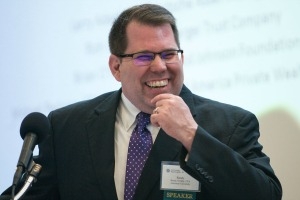Business
For Kogod Students, 4 Tips for Building Your Business Career

Randy Nordby, Kogod’s new program director for the MS Finance and MS Real Estate programs, is all about making a contribution. He’s an innovator—one who improves whatever he’s working on, wherever he’s working. “It’s my focus everywhere I go. If there’s an opportunity to step up, I take it,” Nordby says.
He’s got 13 years of experience and a slew of current positions to prove it. He’s Finance Coordinator for Kogod’s MBA@American program. He serves on the CFA Institute’s board, and is helping the CFTC develop their education program. And, most impressively, he recently passed the Fundamentals of Sustainability Accounting (FSA) Level II exam—a credential only 150 people hold worldwide.
He wants to pay his experience forward to his students. He hopes his knowledge will help them win their dream jobs—Nordby’s ultimate goal. “We don’t make cars or build products here. We help students prepare for jobs,” Nordby says. “I consider myself a success if every student I teach gets the job that they want.”
So, how do students build their dream careers? Below, Nordby shares his words of wisdom: four tips, garnered from his own years of success, on how to build—and advance—one’s business career. It’s one more way for him to make a contribution—one he hopes will inspire students to become innovators, too.
#1 Manage Up
“I’m always looking for areas where I can make suggestions. It’s how I’ve advanced in my career.”
Nordby recalls starting his first job out of college at a call center at Sallie Mae. He spoke to 200 debt-ridden students a day, advising them on how to repay their loans. “I asked, ‘What can I do to prepare myself?'" I wanted to be the most knowledgeable person there.
Fast-forward several years, and Nordby was running an entire team who didn’t advise—they educated. “We met with college financial officers and explained to students how to limit their loans,” he says.
He advises his students to always stay aware and engaged at work. “There’s always ways to improve what you’re doing,” he says.
#2 Focus on Your Strengths
“It’s all about specialization in today’s society. I don’t think there's time to focus on weaknesses—concentrate on what you’re good at.”
Nordby admits that’s part of the reason he’s gotten so far. He knew he was skilled at finance, and he’s good with people. He’s also great at multitasking. Nordby harnessed his strengths to build his career—one that’s marked with promotions and job diversity.
“If you have a skill, you’re persistent and a hard worker, that’s where you’ll show yourself,” he says.
#3 Follow Your Passions
“I don’t feel like I’m working because I’m doing what I really love. Find something you’re interested in and develop your skill set around it.”
Nordby comes from a long line of doctors and engineers—many of whom knew what they wanted to do since childhood. For Nordby, it was different. “I needed time to see what was out there,” he says. “I had to find my passion.”
He’s glad he took the time to find the career that was right for him. He’s working in a field he loves and giving back to a community equally as passionate.
“Eight hours a day is a long time if you don’t like your job,” he says. “Invest the time exploring now, and it’ll pay off later.”
#4 Make it Better
“Constrained optimization. These two words have always stood out to me. There will always be barriers to your success, but you want to ask yourself, ‘How can I optimize this? How can I make it better?”
Nordby is a life-long learner. He’s constantly finding ways to deepen his knowledge and continue to develop his expertise. “I earned my third master’s degree in finance from Kogod. I knew I could do a better job at representing the program if I myself had experienced it.”
He’ll finish his doctoral degree this Fall, building on the experience he’s gained at Kogod and in his career. He believes you’re never too old to embark on something new. “I thought I’d retire as a portfolio manager, but instead I started an education career I really love,” he says.
Nordby encourages his pupils and colleagues alike to search out “optimization opportunities”—chances to grow and advance oneself. It’s the key to one’s success, he says, and achieving one’s dreams.